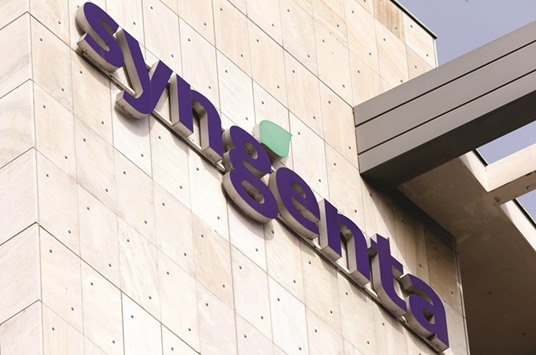State-owned Chinese chemicals group ChemChina is ready to offer more concessions to win European Union antitrust approval for its $43bn bid for Swiss pesticide and seed group Syngenta, a source with direct knowledge of the process said.
Clinching China’s biggest-ever foreign acquisition is taking longer than planned amid a flurry of deals in the agriculture sector that Syngenta, the world’s biggest pesticides maker, said yesterday had swamped competition watchdogs.
Syngenta expects the transaction to close around the end of March 2017, rather than this year as first planned, but insisted it would go ahead despite increased scrutiny by watchdogs gauging the impact of big deals on farmers and consumers.
Syngenta’s deal with ChemChina is one of two under EU scrutiny, while another mega deal involving Bayer and Monsanto is expected to land on the regulator’s desk in coming months.
Bayer and Monsanto have not formally requested EU approval but the European Commission has to consider this deal as well when assessing the ChemChina and Syngenta linkup, and another deal involving DuPont and Dow Chemical, to take into account the changing landscape, said an EU official.
Syngenta stock plunged more than 9% on Monday after a European Commission spokesman said the companies had not offered concessions to get the deal through, raising concerns about the likelihood of a longer, full investigation. ChemChina submitted a proposal to the Commission in September, including a plan to divest some $20mn worth of assets from its agrichemical subsidiary Adama Agricultural Solutions, the Beijing-based source told Reuters.
But the Commission raised “a more detailed menu of possible remedies” last week, said the source, who declined to be identified because he was not authorised to speak to the media.
ChemChina is ready to cooperate fully with the Commission and come up with a satisfactory solution, the source added.
A ChemChina spokesman was not immediately available.
The Commission sometimes opens a full investigation to get a better understanding of complex takeovers, whereby some are eventually cleared with no or minor concessions, though this is probably not the case for ChemChina because of the wave of consolidation moves and the diverse interests involved.
Regulatory scrutiny over the ChemChina-Syngenta deal comes as global agricultural chemicals makers bulk up to better compete with each other.
Dow Chemical and DuPont plan a $130bn merger, while Bayer aims to buy Monsanto for $66bn. Syngenta chief executive Erik Fyrwald told Reuters he expected the EU anti-trust watchdog to take its regulatory review of the ChemChina deal to a second phase once the October 28 deadline for fast-track approval passes.
“I think it is likely and we are expecting it, but it is not certain,” Fyrwald said.”The process was going along and then on September 14...
the Bayer and Monsanto deal was announced, since then in both the US and the EU there has been a very large escalation in data requests and questions.” The Commission declined comment.
Fyrwald dismissed suggestions that the deal could be complicated by a possible merger of ChemChina and Sinochem. “We talk to ChemChina regularly on a range of issues... and they have repeatedly assured us that they are not in any discussions about merging with Sinochem,” he said.
Fyrwald declined to comment on the regulatory impact of the other two big deals in the pipeline. “But I can tell you that the regulators are taking a very close look at everything.”
Syngenta reported third-quarter sales of $2.5bn, down 3% year-on-year at constant exchange rates.

The logo of Swiss agrochemicals maker Syngenta at its headquarters in Basel, Switzerland. The pesticide and seed group’s deal with ChemChina is one of two under EU scrutiny, while another mega deal involving Bayer and Monsanto is expected to land on the regulator’s desk in coming months.
